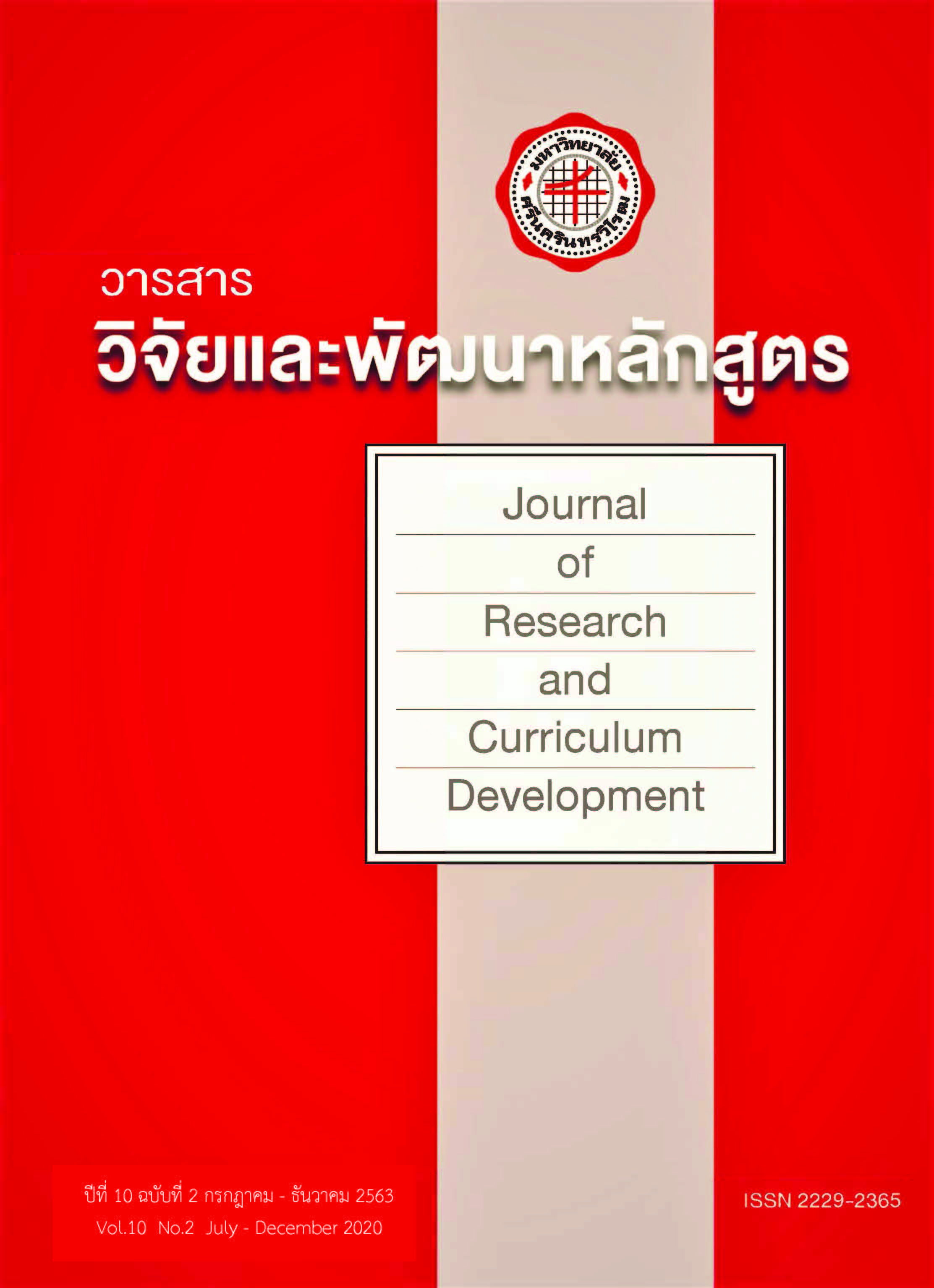การพัฒนาการจัดการเรียนรู้เชิงรุกแบบบูรณาการบนห้องเรียนเสมือนจริงเพื่อส่งเสริมวิธีคิดแบบเติบโตและผลสัมฤทธิ์ทางการเรียน เรื่อง จิตวิทยาการเรียนรู้ของนักศึกษาระดับปริญญาตรี
Keywords:
Integrated Active Learning, Virtual Classrooms, Growth Mindset, Learning AchievementAbstract
งานวิจัยครั้งนี้มีวัตถุประสงค์เพื่อพัฒนาแผนการจัดการเรียนรู้เชิงรุกแบบบูรณาการบนห้องเรียนเสมือนจริงเพื่อส่งเสริมวิธีคิดแบบเติบโตและผลสัมฤทธิ์ทางการเรียนเรื่อง จิตวิทยาการเรียนรู้ ที่มีคุณภาพและเปรียบเทียบวิธีคิดแบบเติบโตและผลสัมฤทธิ์ทางการเรียน เรื่อง จิตวิทยาการเรียนรู้ ของนักศึกษาที่เรียนตามแผนการจัดการเรียนรู้ที่พัฒนาขึ้นระหว่างก่อนเรียนกับหลังเรียน กลุ่มตัวอย่างที่ใช้ในการวิจัย คือ นักศึกษาชั้นปริญญาตรี คณะครุศาสตร์อุตสาหกรรมและเทคโนโลยี สถาบันเทคโนโลยีพระจอมเกล้าเจ้าคุณทหารลาดกระบัง ที่ลงทะเบียนเรียนจิตวิทยาการศึกษา ภาคเรียนที่ 1 ปีการศึกษา 2561 ได้จากการสุ่มแบบกลุ่ม (Cluster Random Sampling) ด้วยการจับสลาก 1 ห้อง จำนวน 45 คน เครื่องมือที่ใช้ในการวิจัยคือ 1) แผนการจัดการเรียนรู้แบบบูรณาการเชิงรุกบนห้องเรียนเสมือนจริง เรื่อง จิตวิทยาการเรียนรู้ 2) แบบประเมินคุณภาพแผนการจัดการเรียนรู้ 3) ห้องเรียนเสมือนจริงบนระบบ Google classroom 4) แบบวัดวิธีคิดแบบเติบโตและ 5) แบบทดสอบวัดผลสัมฤทธิ์ทางการเรียน สถิติที่ใช้ในการวิเคราะห์ข้อมูล คือ ค่าเฉลี่ย ส่วนเบี่ยงเบนมาตรฐาน และสถิติทดสอบทีแบบวัดซ้ำกลุ่มเดียว (Paired-samples t-test) ผลการวิจัยพบว่า แผนการจัดการเรียนรู้แบบบูรณาการบนห้องเรียนเสมือนจริง มีคุณภาพอยู่ในระดับดีมาก ( = 4.86) 2) และนักศึกษามีวิธีคิดแบบเติบโตและผลสัมฤทธิ์ทางการเรียน เรื่อง จิตวิทยาการเรียนรู้ สูงกว่าก่อนเรียนอย่างมีนัยสำคัญทางสถิติที่ระดับ .01
References
กรมวิชาการ. (2544). แนวทางการวัดและประเมินผลการเรียน. กรุงเทพฯ : โรงพิมพ์คุรุสภา
ลาดพร้าว
ทวีศักดิ์ จินดานุรักษ์. (2560). ครูและนักเรียนในยุคการศึกษาไทย 4.0 .วารสารอิเล็กทรอนิกส์
การเรียนรู้ทางไกลเชิงนวัตกรรม, 7(2), 14-29
ทิศนา แขมมณี. (2557). ศาสตร์การสอน : องค์ความรู้เพื่อการจัดกระบวนการเรียนรู้ที่มี
ประสิทธิภาพ. พิมพ์ครั้งที่ 18. กรุงเทพฯ : สำนักพิมพ์แห่งจุฬาลงกรณ์มหาวิทยาลัย
พรรณี ลีกิจวัฒนะ. (2558). วิธีวิจัยทางการศึกษา. พิมพ์ครั้งที่ 8. กรุงเทพฯ : มีน เซอร์วิส ซัพ
พลาย.
ปริญญา เทวานฤมิตรกุล. (2558). การศึกษาที่มุ่งผลลัพธ์(Outcome-based Education)
โดยผู้เรียนเป็นศูนย์กลาง (Student-Centered) และใช้โครงงานเป็นฐานในการ
เรียนรู้ (Project-based Learning). ใน เอกสารประกอบการบรรยายเรื่อง “Active
– Based Learning : What, Why and How ?” และเรื่อง “Workshop : Howto
Implement Active – Based Learning in Your Classroom?”.เชียงใหม่:มหาวิทยาลัยเชียงใหม่
มารุต พัฒผล. (ม.ม.ป.). เอกสารประกอบการเรียนรู้รายวิชา สัมมนานวัตกรรมการโค้ชเพื่อ
การรู้คิด. กรุงเทพฯ : บัณฑิตวิทยาลัย มหาวิทยาลัยศรีนครินทรวิโรฒ
มูลนิธิสยามกัมมาจล. (2562). คุณลักษณะ ครูดี 4.0 สืบค้น 24 ธันวาคม 2562,
จาก https://www.scbfoundation.com/media_knowledge/knowledge/292/
คุณลักษณะ-ครูดี-4-0-16115
สุวิทย์ มูลคำ และคณะ. 2551. การเขียนแผนการจัดการเรียนรู้ที่เน้นการคิด. กรุงเทพฯ : อี เค
บุ๊คส์.
.
เอกสารอ้างอิง (อังกฤษ)
Anderson, L.W., Krathwohl, D.R., Airasian, P.W., Cruikshank, K.A., Mayer, R.E.,
Pintrich, P.R., Raths, J., & Wittrock, M.C. (2001). A taxonomy for learning,
teaching, and assessing: A revision of Bloom’s Taxonomy of Educational
Objectives (Complete edition). New York: Longman.
Aronson, J., Fried, C. B., & Good, C. 2002. Reducing the effects of stereotype threat
on African American college students by shaping theories of intelligence.
Journal of Experimental Social Psychology. 38(1) : 113-125.
Blackwell, L. A. , Trzesniewski, K. H. , & Dweck, C. S. (2007). Theories of intelligence
and achievement across the junior high school transition: A longitudinal
study and intervention. Child Development. 78(1), 246-263
Dweck, C. S. (2006). Mindeset: The new psychology of success. New York: Random
House.
Dweck, C. S. (2009). Who Will the 21st-Century Learners Be?. Knowledge Quest,
38(2), 8–9.
Dweck C. S. (2010). Even geniuses work hard. Educational Leadership,
68 (1), 16-20.
Dweck, C. (2012). Mindset: How You Can Fulfill Your Potential. London:
Robinson.
Esparza, J., Shumow, L., & Schmidt, J. A. 2014. Growth mindset of gifted
seventh grade students in science. NCSSSMST Journal. 19(1) : 6-12.
Frazee, B.M. & Rundnitski, R.A. (1995). Intregrated Teaching Methods : Theory,
Classroom Applications, Field-Based Connections, Aldany: Delmar
Publishers.
Good, C., Aronson, J., & Inzlicht, M. (2003). Improving adolescent's standardized
test performance : An intervention to reduce the effects of stereotype threat. Journal of Applied Developmental Psychology. 24(1) : 645-662.
Lardizabal, S.A.et al. (1970) Methods and Principles of Teaching. Quezon City:
Alemar-Phoenix.
King, R. B. (2012). How you think about your intelligence influences how adjusted
you are : Implicit theories and adjustment outcomes.
Personality and Individual Differences, 53(5), 705-709.
Meyers, C. and Jones, T. B. (1993). Promoting Active Learning: Strategies for the
College Classroom. San Francisco: Jossey-Bass.
Mueller, C. M. , & Dweck, C. S. (1988). Praise for intelligence can undermine
children’s motivation and performance. Journal of Personality and Social
Psychology, 75 (1) ,33-52
Rienzo, C., Rolfe, H., & Wilkinson, D. (2015). Changing Mindsets: Evaluation
Reportand Executive Summary. London: National Institute of Economic and
Social Research.





